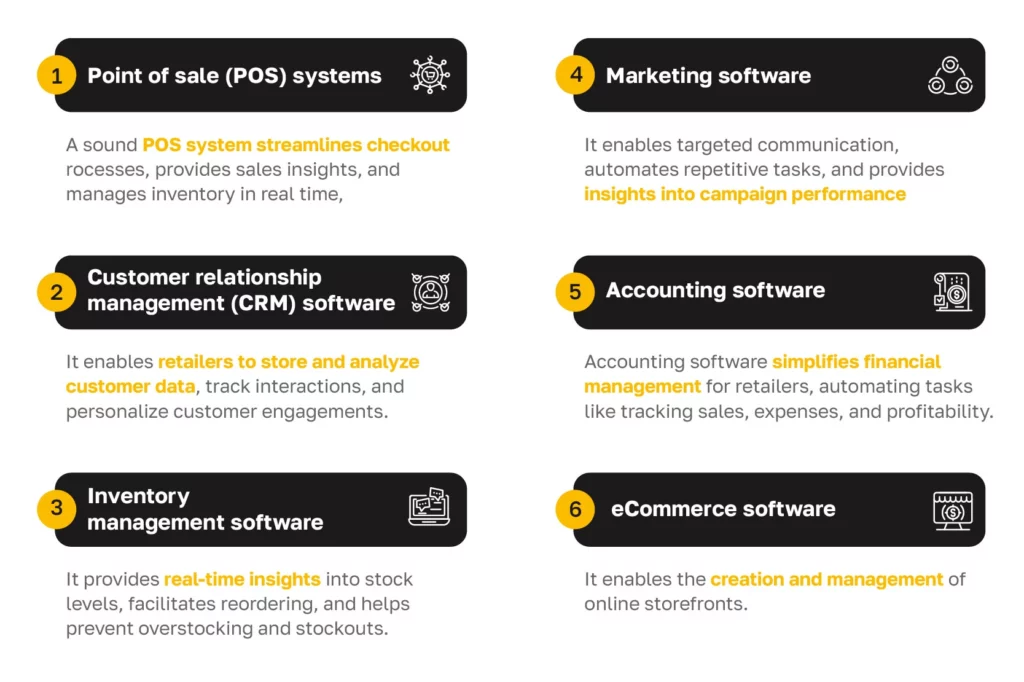Are you seeking new ways to improve your business operations? Do you find yourself burdened by the weight of managing inventory, engaging customers, and juggling sales across multiple channels? The frustration of trying to keep up with the retail landscape can leave anyone feeling stuck and unsure of where to turn next.
That’s where WillDom’s expertise in wrestling with the complexities of retail management in an attempt to streamline processes comes into play. We’re here to provide you with the information and resources you need to revolutionize your retail operations.
Table of Contents
What Is Retail Software?
Retail software encompasses a broad range of applications designed to assist businesses in managing various aspects of their retail operations. It streamlines operations, enhances efficiency, and boosts profitability. By integrating these tools, retail stores can navigate the intricacies of modern retail more effectively, adapting to changes and meeting consumer expectations with agility and precision.
The Most Frequently Used Retail Industry Software
Leveraging the right system is a must for survival and growth. The digital transformation has ushered in a variety of retail software solutions, each designed to tackle specific aspects of the business.
Below are six types of retail software that are foundational to modern retail businesses:

#1 – Point of sale (POS) systems
A Point of Sale (POS) system is the epicenter of retail activity, integrating sales, inventory, and customer management. A sound POS system streamlines checkout processes, provides sales insights, and manages inventory in real time, ensuring a smooth operational flow and an enhanced customer experience.
Without a POS system, retailers would face chaotic sales floors, slow checkout processes, and inaccurate inventory tracking. These problems lead to customer dissatisfaction due to long waiting times, lost sales opportunities, and inventory discrepancies, making it challenging to meet customer demands effectively.
#2 – Customer relationship management (CRM) software
CRM software acts as the backbone for building and maintaining relationships with customers. It enables retailers to store and analyze customer data, track interactions, and personalize customer engagements. This targeted approach helps foster loyalty and increase customer lifetime value through personalized experiences and offers.
Retailers operating without a CRM would lose the ability to understand and anticipate customer needs, resulting in impersonal service and missed opportunities for engagement. This lack of personalization can decrease customer retention and loyalty, as customers might feel undervalued and overlooked.
#3 – Inventory management software
Inventory management software is crucial for maintaining the delicate balance between demand and supply. It provides real-time insights into stock levels, facilitates reordering, and helps prevent overstocking and stockouts. This ensures that the right products are available at the right time, optimizing inventory turnover and reducing holding costs.
The absence of an inventory management system can lead to a logistical nightmare, with frequent stockouts or excessive unsold inventory. Retailers would struggle with manual stocktakes, inaccurate records, and poor purchasing decisions, which could severely impact customer satisfaction.
#4 – Marketing software
Marketing software is one of the biggest software development outsourcing trends, as it empowers retailers to create, manage, and analyze marketing campaigns across multiple channels. It enables targeted communication, automates repetitive tasks, and provides insights into campaign performance, helping retailers attract new customers and retain existing ones.
Without marketing software, retailers would have to revert to time-consuming, manual marketing processes, making it challenging to scale campaigns or measure their effectiveness. This would likely result in generic, less impactful marketing efforts that fail to engage customers or stand out in a crowded marketplace.
#5 – Accounting software
Accounting software simplifies financial management for retailers, automating tasks like tracking sales, expenses, and profitability. It provides valuable financial insights, helping retailers make informed decisions and ensure compliance with financial regulations.
Without these systems, retailers would have to perform manual bookkeeping, which is prone to errors and inefficiencies. This could lead to inaccurate financial reporting, cash flow problems, and potential legal issues, jeopardizing the economic health and sustainability of the business.
#6 – eCommerce software
eCommerce software is essential for retailers looking to expand their digital presence with an online store. It enables the creation and management of online storefronts. It also integrates with other retail systems and provides a seamless shopping experience for customers, regardless of the channel they choose to shop through.
Lacking eCommerce software, retailers would miss out on the vast online market, limiting their reach and growth potential. The manual management of online sales channels could result in inconsistent customer experiences, inventory mismatches, and increased operational burdens, hindering overall business performance.

What Are the Benefits of Using Software in the Retail Industry?
Retail software brings various benefits to the table, each contributing to the growth and competitiveness of a retail business. These benefits include:
- Enhanced operational efficiency
- Improved customer experiences
- Accurate inventory management
- Data-driven decision making
- Increased sales and profitability
- Seamless multichannel integration
- Better financial management and compliance
How Do You Choose the Right Retail Software?
With an array of options available on the market, it’s crucial to navigate the selection process methodically to ensure that the chosen software aligns with your business objectives. This way, you’ll also know what you want if you decide to opt for outsourcing software development services.
Here is a three-step approach to choosing the right retail software for your business.
Step 1: Assess your business needs and goals
Start by thoroughly analyzing your current operations and pinpointing areas that require improvement, optimization, or automation. Identify your business’s specific challenges, such as inventory discrepancies, customer engagement gaps, or sales processing inefficiencies. Understanding your objectives will create a focused benchmark for selecting systems that address these priorities.
Step 2: Research and compare options
Explore different retail software solutions that cater to your identified needs, paying close attention to features, scalability, integration capabilities, and user reviews. Compare these solutions, assessing how each aligns with your business objectives and operational workflows. Think about things like how easy it is to use, how customizable it is, and how much customer help is available.
Step 3: Evaluate vendor reliability and support
Look for vendors known for reliable, ongoing support and a commitment to continuously improving their products. Consider the vendor’s responsiveness to customer feedback and track record for updating and enhancing their software to meet evolving retail needs. Also, ensure that the chosen vendor offers comprehensive training and support services to facilitate a smooth transition.

WillDom Help You Build the Perfect Retail Software for Your Company!
It’s unlikely that you will find a retail software option that encompasses all your needs, and opting for multiple specialized solutions can quickly become a financial burden. The most efficient and cost-effective solution is to outsource to a retail software development company and gain access to tailored solutions that align perfectly with your business operations.
At WillDom, our team of custom software development experts and industry specialists works closely with you to understand your goals. We ensure the final product solves your current issues and scales with your business. We are known for our customer-first approach and will keep you updated every step of the way. Contact WillDom today and take the first step toward transforming your retail operations!

